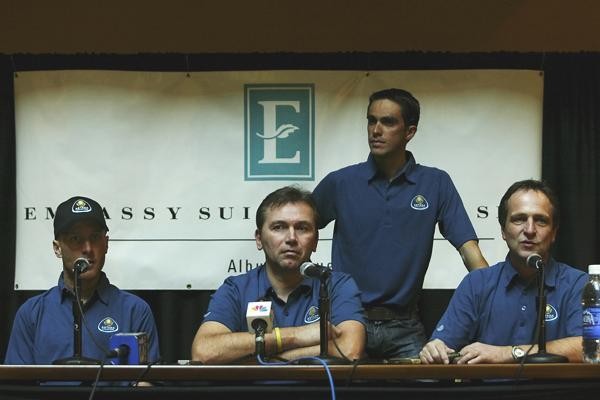Bruyneel making the best of Astana's situation
By Laura Weislo On the eve of the Vuelta al País Vasco , Astana team director Johan Bruyneel is...

By Laura Weislo
On the eve of the Vuelta al País Vasco, Astana team director Johan Bruyneel is still stinging from the squad's exclusion from the Tour de France, but is hoping to make the best of a bad situation. His star rider, 2007 Tour champion Alberto Contador, was not able to defend his title in Paris-Nice, either, but instead put in a convincing victory in the Vuelta a Castilla y León in March. The young Spaniard will be looking to repeat that performance in the Basque tour.
The team is clearly on a mission to prove that the ASO has made a mistake in leaving out one of the strongest teams in the world from the sport's biggest race. The team was refused entry into any of the ASO's races, the organisation citing the 2007 Astana team's multiple doping positives as the reason.
Contador has now been forced to re-focus his season on winning the País Vasco, the Dauphiné Libéré, and then going on to contest the victory in the Vuelta a España, and he will do so with much of what would have been the 2008 Tour de France team at his side.
But on the positive side, Astana has been able to avoid much of the stress surrounding the ASO's battle with the UCI over sanctioning of its events. Earlier this year, Astana was in the unusual position of being excluded from Paris-Nice by the ASO, but, as a part of the professional teams' organisation, the AIGCP, also being asked to vote on the decision of the teams to race in the event against the UCI's wishes.
"As member of AIGCP we were invited but we abstained," Bruyneel told Cyclingnews. "Personally, I think that the teams made a mistake by participating in a race that is not on the UCI's calendar," he opined. The decision was a contentious one, and one that will likely have repercussions for all the riders who participated.
"In the meantime, everybody (the ASO as well - look at the recent decision to put Paris-Roubaix on the UCI's calendar) realized that cycling needs one uniform regulation," Bruyneel continued. "Every race under the umbrella of the UCI (not as organizer but as arbiter) seems more than logical."
Get The Leadout Newsletter
The latest race content, interviews, features, reviews and expert buying guides, direct to your inbox!
The Belgian did not, however, think that the ASO was trying to take over the UCI's role with their actions on Paris-Nice, as UCI president Pat McQuaid alleged. "I think that in the first place ASO was trying to protect their own race. They realize that they are strong enough to play a dominant role in cycling. They're just defending their territory."
Bruyneel told Cyclingnews that while the team is still a member of the AIGCP, but that he questioned the merit of an organisation which lacks cohesiveness. "We ask ourselves more and more why we are a member of such a divided association, whose president has another agenda than protecting the rights of the teams," remarked the Belgian.
Frenchman Eric Boyer took over the presidency of the AIGCP from Bruyneel's compatriot Patrick Lefevere early this year, but has had a rocky start to his term. The Cofidis manager was caught in the line of fire in the ASO's war with the UCI, and ultimately led the decision to have riders start Paris-Nice in the face of threats of sanctions and fines from the UCI.
Bruyneel has had a turbulent past with the AIGCP. As director of the Discovery Channel, he came under fire for hiring Ivan Basso despite his being implicated in the Operación Puerto affair. The team quit the organisation last June. The group was then divided into two camps over the topic of teams hiring Puerto-implicated riders.
With Astana, the team is back in the AIGCP, but still not getting anything except "moral support" after his squad's exclusion by the ASO, and that even this was only from "the expected teams", Bruyneel said. "Our exclusion by ASO did not affect our vision, our meaning or our vote," he continued, undaunted. "We already turned that page and are looking at the future. It is my goal to ensure that the teams are strong enough to have a real say in the debate. Every team needs to be rated at its true value. The teams must be self-evident interlocutors."
But the 43-year-old has not let the situation stop him from pushing towards future goals, which will most certainly include the 2009 Tour de France.